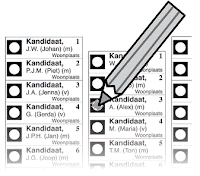The nice thing about elections here is that even foreigners are allowed to vote in local elections. National elections are reserved for citizens, though. Last March 10, we had elections for the city governments. So, on election day, I went to the polling place, which is situated at the old-age home near where we live. Some ten years ago, or so, the polling place was at the school where our children went, and it was just a matter of voting after having brought our child to school. Anyway, it is now located at the old-age home.
About two weeks before the elections, everybody receives their election pass by mail. So, on election day, you bring this pass, plus your passport (or national ID) and show these to the officials at the polling place. They will check your name in a master list, and then give you a ballot. The ballot is a big piece of paper, where the names of the parties are in columns, while the names of the specific candidates in rows. We only vote for one person, in one party.

The system we have is a proportional representation system, where the parties get seats proportionate to the number of votes cast for them. The candidates are in lists, and the order of candidates determine who gets to be elected - thus, if a party gets 5 seats for example, candidates No. 1 to No. 5 of that party gets in. You can simply vote for the No.1 candidate for your party. But you can also vote for, say No. 10. Now, if candidate No. 10 gets a certain number of votes, he will get a seat (providing that the party as a whole gets at least 1 seat), and displaces, say, No. 5. This is called preferential voting. So, our system combines voting for parties with individual voting. And it is not too uncommon for No. 50 candidate to get elected.
Well, the voting was rather short, since there is only one candidate to be selected, whose name we mark with a red pencil. The voting lasts from 8 am till 9 pm. After this, the ballots are counted, and the results are then sent to the municipal building for collation. The results are known at about 11pm or midnight. Fast. I still don't get it why it takes so long in the Philippines...
Anyway, we voted in March for our municipal governments. In June 10, we will vote again, this time for the members of parliament. In addition, we also have elections (sometime within a 4 year period) for the provincial government, and for the European parliament.


